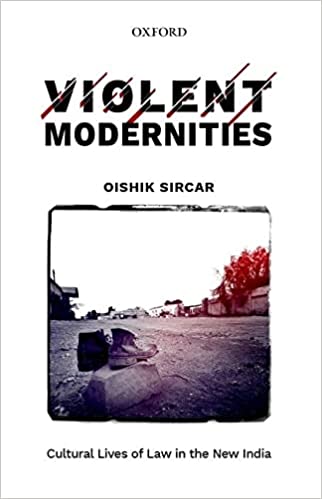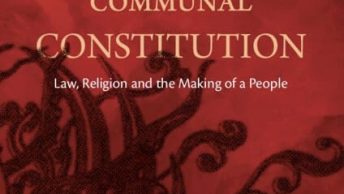I read Oishik Sircar’s Violent Modernities: Cultural Lives of Law in the New India with interest, intrigue, solidarity, and in some places, with a bit of concern. This book is a suturing of seven essays that were previously published between 2011 and 2018 by the author (Chapter 2 was co-authored with Debolina Dutta) in various venues that he lists in the Acknowledgements. I read these seven essays in sequence, although the author provides two strategies of reading them: in sequence and individually. I write these remarks noting Sircar’s anguish at the frightening phantasm that is contemporary India.
On Method
- queerfeministmarxistpostcolonial
Sircar writes these essays, I understand, as a professor of pathos – the term he uses to describe Upendra Baxi in Chapter 7 (also the title of that Chapter). Sircar heaves under the burden of analysing and living, as an activist-academic, through the rise of Hindu majoritarian rule in India. This book serves as a powerful lament on the state of things in India, as they have panned out across the past decade. Violent Modernities provides hard-hitting political and social commentary on contemporary India, although the author writes a bit in Chapter 5 about the settler colonial underpinnings of the Australian state. What I am less convinced about is the claim that the book unpacks the relationship between law and violence, as claimed in the Preface where the author defines the terms law, Law, modernity, culture, and New India. These definitions, especially those of law and modernity do not feature consistently in the showing (rather than telling) as the book progresses. It is evident that the author is deeply troubled by the double-bind of being an activist and being a privileged person whose very being shares complicity in global capitalism and its Indian iteration that is hand-in-glove with the Hindu right political factions. It is, ultimately, not clear to me what this series of essays reveals about the nature of law – law being a distinct socio-political institution, different from the state, state power, state effect and ideology at large.
Sircar follows, by his own admission (Sircar 2021: xxxv), the queerfeministmarxistpostoclonial method, especially in treating law and the state. Sircar writes: “The book is written in the form of a bricolage of descriptive refractions that have animated my practices of queerfeminstmarxistpostcolonial critique and activism both inside and outside the legal academy.” I take this bricolage and descriptive refraction claims seriously. The book works well as a bricolage, but as the essays claim to be descriptive canvases refracting through the person of the author, I am unsure in what way and to what end the author serves as a refractive device.
I have two sources of discomfort here: (1) the obvious contradictions between the Marxist and the postcolonial perspectives (see generally Dirlik 1994; Ahmad 1998; Brennan 2006; Bartolowich 2002), especially over the question of identity politics, are not engaged with or resolved; (2) the method seems to translate into a kind of New Left political criticism of sources of state power being patently violent to marginalized communities. That the corpus of state power and the source of sovereignty should be looked at with suspicion because of their routine tendencies of abuse of power, is a given to a reader like me who shares much of Sircar’s worries. Being an anthropologist with an abiding interest in the law, and an active interest in sovereignty, I didn’t understand what to take away from Sircar’s method other than the fact that both reader and author were to be on the side of the historically disadvantaged. Sircar makes more interesting theoretical provocations about ‘stuckness’ (Sircar 2021: 169, citing Lauren Berlant) and ‘negative moment’ (Sircar 2021: 177, citing Achille Mbembe) using his own positionality within the fold of protest, but unfortunately, those claims do not form the organizing principles of the book.
- Law and Violence
The fundamental claim made in the Preface and Chapter 1, is that the law is not a protector from violence, but is in fact an initiator and active perpetrator of violence. This position is perhaps surprising to liberal theorists of the law. However, in the domain of critical theory, especially of the Marxist canon, the position that law carries within it the pure monopoly over violence, that there is nothing surprising about the law being an active perpetrator of violence, is enshrined in the now seminal essay Walter Benjamin, written in 1914. I notice that Sircar has not referred to Benjamin in the book Violent Modernities. I remain puzzled about the reason for this silence on Benjamin. Let me quote from Benjamin’s 1914 essay, reprinted in the collection of essays under the title Reflections (1986: 280-281):
“It will be argued that a system of legal ends cannot be maintained if natural ends are anywhere still pursued violently. In the first place, however, this is a mere dogma. To counter it one might perhaps consider the surprising possibility that the law’s interest in a monopoly of violence vis-a-vis individuals is not explained by the intention of preserving legal ends but, rather, by that of preserving the law itself; that violence, when not in the hands of the law, threatens it not by the ends that it may pursue but by its mere existence outside the law.”
As Duncan Stuart explicates in an essay on Benjamin in the Jacobin magazine:
“The law empowers police to use violent means to apprehend their target, regardless of their innocence. Police are, however, both enactors and interpreters of the law. This ambiguity means that the violence they commit is both legal and extralegal. For Benjamin, the arbitrariness bound up with any exercise of the law ensures that there is violence at the heart of capitalist legal systems.”
Benjamin being arguably the most important commentator on law and violence, to my mind, one must also regard other twentieth century Marxist theorists of law and the state – the names coming to mind being Louis Althusser and Nicos Poulantzas. Sircar refers to Marx himself on several occasions in these seven essays, and Sylvia Federici (Sircar 2021: 218) and Pashukanis in passing (Sircar 2021: 239).
Let me quote from Louis Althusser’s 1969 ruminations on law:
“Law is necessarily formal, in that it bears not on the content of what is exchanged between legal persons in of purchase and contracts of purchase and sale, but on the form of these contracts regulating exchange, a form defined by the (formal) acts of legal persons who are formally free and equal before the law. It is to the extent that law is formal that it can be systematized as tendentially non-contradictory and comprehensive. Law’s formalism and its correlative systematicity constitute its formal universality: the law applies to – and may be invoked by – every person legally defined and recognized as a legal person.
…. The obvious effect of law’s formalism is to bracket, in law itself, the different contents to which the form of law is applied. But it by no means makes these contents disappear by enchantment. Quite the contrary: the formalism of law makes sense only to the extent that it is applied to defined contents that are necessarily absent from law itself. These contents are the relations of production and their effects.
Hence, we can begin to see that:
1) Law only exists as a function of the existing relations of production.
2) Law has the form of law, that is, formal systematicity, only on condition that the relations of production as a function of which it exists are completely absent from law itself.
This singular situation of law, which exists only as a function of a content from which it abstracts completely (the relations of production), explains the classical Marxist formula: law ‘expresses’ the relations of production while making no mention at all, in the system of its rules, of those relations ofproduction. On the contrary, it makes them disappear.”
Sircar chooses not to marshal Althusser’s work in making his argument. It is also worth remembering Nicos Poulantzas’s revision of Marx, especially on the nature of the problem of the capitalist state, that could have been easy arsenal for constructing Sircar’s argument.
Sircar offers these essays as meditations on cultural politics in New India, at the heart of which lies law, as matter and metaphor (Sircar 2021: xxv). I was very taken with the poeticity of this turn of phrase. But I found, as I finished reading the book, that Sircar’s treatment of law as metaphor was scarce. Law appeared in these essays very much as matter – through cases (the Koushal and NALSA judgments, for instance in Chapter 4), statutes (the Immoral Traffic (Prevention) Act, 1956, in Chapter 2), in legal academic treatises (the discussion of U Baxi’s work at length in Chapter 6), in police usage of the law in cinematic narrative (the discussion of the Govind Nihalani film Dev in Chapter 3).
Lastly, on method, I am surprised that a Habermasian approach to rights-talk and rights-based emergence of publics and counterpublics (see generally, Habermas 1995(1956); Fraser 2000; Warner 2005) did not attract Sircar. Rights may be critiqued using Sircar’s chosen method, for sure. But surely, some, if limited, power to engage in critical-rational debate with the state in an open marketplace of speech, is unravelled by the law and liberal legal domain (see generally, De 2018).
Works Cited
- Ahmad, Aijaz. In Theory: Classes, Nations, Literatures. London: Verso, 1994.
- Bartolowich, Crystal. Introduction. In Marxism, Modernity, and Postcolonial Studies. UK: Cambridge University Press, 2002.
- Benjamin, Walter. Critique of Violence. In Reflections: Essays, Aphorisms, Autobiographical Writings. Peter Demetz (ed.). New York: Schocken Books, 1986.
- Brennan, Timothy. Wars of Position: The Cultural Politics of Left and Right. New York, NY: Columbia University Press, 2006.
- De, Rohit. A People’s Constitution: The Everyday Life of Law in the Indian Republic. Princeton, NJ: Princeton University Press, 2018.
- Dirlik, Arif. The Postcolonial Aura: Third World Criticism in an Age of Global Capitalism. New York: Routledge, 1998.
- Fraser, Nancy. Rethinking Recognition. New Left Review. May/June 2000.
- Habermas, Jurgen. The Structural Transformation of the Public Sphere: An Inquiry into a Category of Bourgeois Society. Cambridge, MA: MIT Press, 1995.
- Warner, Michael. Publics and Counterpublics. Princeton, NJ: Princeton University Press, 2005.
Atreyee Majumder is an anthropologist. She earned her doctoral degree from Yale University and has been an Andrew Mellon Postdoctoral Fellow at the Jackman Humanities Institute, University of Toronto. She is currently Assistant Professor of Sociology at the National Law School of India University, Bengaluru.






[…] Posted byAtreyee Majumdar […]
Your article helped me a lot, is there any more related content? Thanks!
Thank you very much for sharing, I learned a lot from your article. Very cool. Thanks.